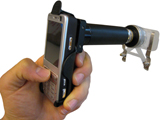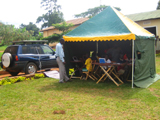Intel Chairman Announces Winners of INSPIRE•EMPOWER Challenge
Four Winners Awarded $100,000 to Fund
Technology Projects Solving Real-World Problems
INTEL DEVELOPER FORUM, Beijing, April 8, 2009 – During his keynote today at the Intel Developer Forum (IDF) in Beijing, Intel Corporation Chairman Craig Barrett announced the four winners of the INSPIRE•EMPOWER Challenge. Launched at the IDF in San Francisco last summer, the challenge called on the developer community to submit the most innovative ideas for applying technology to address some of the world’s most pressing problems related to education, health care, economic development and the environment.
More than 200 proposals were submitted from companies, non-profit organizations, non-governmental organizations (NGO), universities and individuals from 44 countries around the world.
"The caliber of submissions demonstrates the incredible collaborative power of the developer community to use technology to help solve real-world problems," said Barrett. "Today we honor the winners of this challenge and celebrate the hundreds of other innovative ideas aimed to help promote social and economic growth worldwide."
The winners of the four $100,000 prizes were evaluated primarily for impact sustainability and innovativeness. The prize money will be used solely toward the implementation of the solution.
CellScope: Telemicroscopy for Disease Diagnosis: Daniel Fletcher, professor at the University of California, Berkeley, leads a research team responsible for the CellScope, a blend of "cell phone" and "microscope." This new approach turns camera-enabled cell phones, smartphones, handhelds and netbooks, such as an Intel-powered classmate PC, into high-resolution, handheld microscopes with the capability to capture and transmit images. CellScope provides a portable and inexpensive way to diagnose and monitor infectious diseases, such as tuberculosis and malaria in the developing world. Great Lakes Cassava Initiative (GLCI): Michael Potts, Catholic Relief Services’ director for GLCI, is overseeing a pilot project using laptops to help cassava farmers increase food availability and incomes. Millions of families in East and Central Africa rely on cassava as a primary food source, but two virulent diseases are wiping out fields across the region. GLCI aims to educate 1.15 million farmers in six countries about these diseases and provide them with disease-resistant cassava plants. The laptops will facilitate information exchange among farmers, field agents and project managers; support remote distribution of training modules; and improve disease monitoring through automatic data transfers. Mobile Solar Computer Classroom (MSCC): Eric Morrow, executive director of the Maendeleo Foundation in Uganda, operates a computer-lab-on-wheels that takes teachers to multiple schools each week to provide PC skills, training to up to 100 children per day. Topped with solar panels to re-charge the computers, the MSCC is a modified SUV with a foldable tent, tables, chairs and 15 Intel-powered classmate PCs. The foundation hopes to open the doors to better paying jobs and to spur an African-owned and -operated computer services industry to boost local economies, decrease unemployment and help alleviate poverty. Rural Livelihood Enhancement: Bibek Chapagain, Clean Energy Group director at Winrock International, has proposed a Rural Livelihood Enhancement project to deliver information and communication technology (ICT) services to rural communities in Nepal. To address the lack of grid electricity, the project will utilize renewable power from micro-hydro stations and solar photovoltaic panels. The goal of the project is to bring about economic development and improve access to energy, education, employment and information in remote areas. The ICT service centers will serve as computer labs for students and will be open to the public during off-school hours to provide services to the community.
For more information on the challenge, visit www.intelchallenge.com.
Intel is a trademark of Intel Corporation in the United States and other countries.
* Other names and brands may be claimed as the property of others.
|
 |
| |
| Photography |
|
Click on the images below to download larger JPG versions.
Developed by researchers at UC Berkeley, CellScope is a microscopy system that turns camera-enabled mobile devices into microscopes to diagnose and monitor infectious diseases.
The Mobile Solar Computer Classroom, operated by the Maendeleo Foundation, brings computer education to schools in Uganda.
|
| |
|

